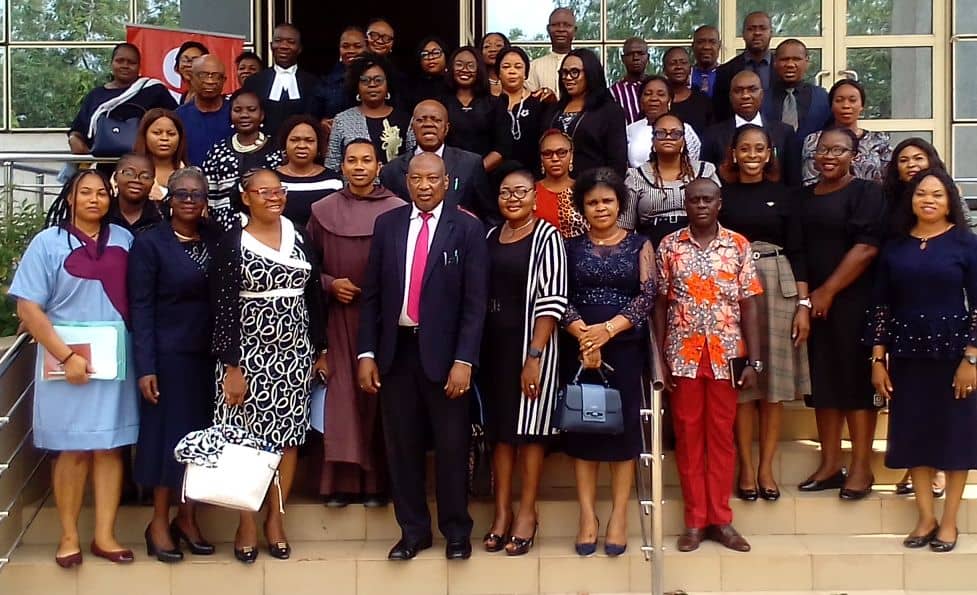Ben Ezechime, Enugu
The Carmelite Prisoners’ Interest Organisation (CAPIO) has said that community service sentences will deter offenders from committing crimes, reduce prolonged trial period and cost of maintaining inmates in the country.
The Legal Officer of CAPIO, Mr Wilson Nneji, said this during a presentation at a One-day Workshop for the Validation of the Draft Framework on Community Service Measures in Enugu State Justice System.
Nneji, who made a presentation on “Understanding The Draft Framework: Overview of the Framework’s Purpose, Scope, Key Components and Principles Underlying the Framework, said that the validation and implementation of the draft framework would benefit stakeholders within the Justice system.
According to him, it will lead to more stakeholders at the community levels – traditional and religious leaders and families and kindreds – getting more involved in the character reformation and rehabilitation of deviant individuals in the community.
“This is because no family, kindred, community or religious group will want a deviant individual of their own bringing shame and negative name calling on them.
“It will ensure that minor offenders and at times first offenders do not mix up with hardened criminals and they continue with a crime-free life-style after their community service sentence,” he said.
He noted that after the validation of the draft, the next stage would training of the community service officers or enforcers or implementers as well as making handbook or guide available to stakeholders in the implementation.
The state’s Commissioner for Justice, Dr Kingsley Udeh, commended CAPIO for the investment and energy put in to promote and propagate community service sentencing as a veritable alternative to custodian service sentencing in Enugu State.
Udeh, represented by a Director in Department of Public Prosecution (DPP), Mrs Ngozi Okoye, said that the Ministry of Justice through the DPP would give support for the community service sentence to succeed in the state.
“I have already appointed some legal officers under my office as community service officers and positioned their minds for them to develop themselves on it and seize any training opportunity on it as well,” she said.
Speaking, Assistant Controller of Corrections, Mr Benjamin Ugwu, noted that there had been laid down provisions in the new Nigerian Correctional Service (NCoS) Act for non-custodian service or sentence as well as officers serving in the non-custodian service.
Ugwu said: “What we wanted is for CAPIO to follow NCoS lead and guidance on community service already enshrined in the new NCoS Act.
“There is no need to reinvent another programme by CAPIO and we presently have enough officers in the non-custodian service of NCoS Enugu State Command. So, there is a need to work with the state Controller of Corrections.”
Contributing, Justice C.C. Ani of the Enugu State High Court, while commending CAPIO for a good job, asked: “Who provides tools that those convicted on community service use to carry out their routine community work?”
Ani further asked: “Who provides uniform for the convicts serving a community service and when will the state High Court open an office for community service officers as well as training for community service officers to understand the system and their obligation?”
Responding, the Executive Director of CAPIO, Rev. Fr. Jude Isiguzo, said that the validation workshop for the proposed operational framework for community service sentence was sequel and a follow-up to the earlier meeting held on the matter by stakeholders on March 18, 2024.
Isiguzo said that a key reason for the validation framework for community service was meant to provide a guide on how it can be effectively implemented in Enugu State and various stakeholders in the justice system keying into it.
“Therefore, the aim of this workshop is for all the stakeholders to check, correct and prove the validity or accuracy of the proposed framework for operationalisation of community service measures,” he said.
He also said that CAPIO would financially provide for all tools and uniforms used by those convicted on community service once the implementation kicks-off in the state.
“While CAPIO is currently building quarters in Oji River to house those that do not have their communities within the state and have no one to stand for them as guarantor(s). For them to stay and serve their community service sentence.
“We appeal to the Chief Judge to provide community service office, appoint enough personnel to the office, while CAPIO will provide training, retraining and guidance,” he added.
Doing the validation, the Chief Judge of Enugu State, Justice Raymond Ozoemena, called on various ministries, agencies and departments of government and stakeholders involved in community service to appoint desk officers or officers for training and implementation.
Ozoemena, represented by Justice Anthony Onovo, lauded CAPIO for devoting time, energy and financial resources to promote, propagate, engage and see that community service sentence work well and effectively in the state.
“When community service sentencing comes in full implementation; it will check congestion in our correction centres and act as a good deterrence to crime in our communities and state since offenders will serve in the open glare of all who know them,” he said.
The chief judge, who later put the validation of the framework to a voice vote of all stakeholders present, got a unanimous “Yes Shout” for the framework to be adopted by all.

